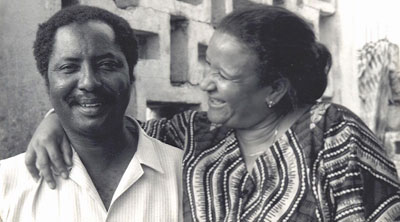December 16 will be the seventh anniversary of the killing of Deyda Hydara, the dean of Gambian journalism. It is also the 20th anniversary of the first issue of The Point, the courageously independent-minded daily that Hydara founded and directed for many years. He was murdered in a drive-by shooting as he drove himself and two staff members home from an evening of somber celebration at The Point’s premises. He had received multiple death threats in the preceding weeks and months. In his last column, he vowed to keep fighting to the end for Gambians’ right to speak their minds.
During his last years, Deyda Hydara was best known for two probing weekly columns. “The Bite” covered a broad range of matters of general interest. “Good Morning, Mr. President” discussed issues of governance and mismanagement, in a polite but incisive tone aimed directly at President Yahya Jammeh, the former junior army officer who has ruled the country since taking over in a coup 17 years ago. Treating Jammeh and his deputies as fallible, fellow human beings reportedly did not go down well at the presidential palace. While The Point continued to carry both columns for some time after Hydara’s death, the intelligence service told the paper’s management in 2006 that the outlet would be shut down if “Good Morning, Mr. President” was not discontinued.
The shutdown of media outlets and unpunished violence against media professionals are not exceptional events in the Gambia. In fact, being an independent-minded reporter in Jammeh’s republic is a greater health hazard than perhaps anywhere else in the African continent. A few months before the Hydara shooting, in the summer of 2004, BBC reporter Ebrima Sillah was almost killed in an arson attack. The premises of The Independent newspaper were also set on fire, allegedly by members of the presidential guard, before the paper was finally shut down by the police, the entire management was rounded up, and its chief editor, Musa Saidykhan, brutally tortured–apparently for having complained to South African then-President Thabo Mbeki, at the time head of the African Union, about the media freedom situation in the Gambia.
Not surprisingly, not a single person has been brought to justice in all these years for attacks on journalists and other Jammeh critics, including Hydara. The president assigned the investigation of the Hydara shooting to the intelligence service, an agency better known for torturing, disappearing, and intimidating the victims of such crimes than catching the perpetrators. The report on their Hydara “investigation” devoted several pages to discussing the victim’s private life, but gave almost no details on crime scene findings, ballistics, or potential political motives.
The regime seems to reserve a special scorn for Deyda Hydara’s audacities, even post mortem. Jammeh tends to dismiss questions about the unsolved crime by pointing out, for example, that lots of people get killed in the Gambia every year. He attacked The Point, publicly and viscerally, for maintaining a “Who Killed Deyda Hydara?” banner on the front page. On the second anniversary of Deyda’s death, the Gambia Press Union put up commemorative posters all over Banjul, calling for justice; they were all taken down overnight. And in January 2007, more than two years after his death, the Hydara family told me that the police refused to provide them with a death certificate so they could claim Deyda’s life insurance (as an international correspondent). Not even death pays for one’s political sins in the Gambia.
This month, my organization, the Open Society Justice Initiative, filed a lawsuit against the Gambian government, on behalf of the Hydara family, with a West African regional court. The court filing argues that not only has the Gambian government failed to conduct a proper investigation into the shooting, but that it contributed to the attack on his life (among others) by tolerating a general climate of impunity for violence against critics of the regime.
President Jammeh recently claimed re-election to another term in office, amid a chorus of electoral fraud allegations. ECOWAS, the West African states’ organization, refused to send an observer mission, in protest against the lack of even minimal conditions for free and fair elections. Responding to charges of violent suppression of dissent, the president likes to say that his conscience is clean and that he fears “only Allah.” In the meantime, the Hydara family and many others in the region are looking for some overdue, earthly justice from the ECOWAS Court.
This is the third case before the ECOWAS Court involving attacks against Gambian journalists, with the tribunal having already found the government responsible for the disappearance of Ebrima Manneh and the torturing of Saidykhan. The Gambian government has failed to comply with either ruling. It is time for the ECOWAS Community to decide whether the Jammeh government meets the minimal conditions for membership in a democratic club.
